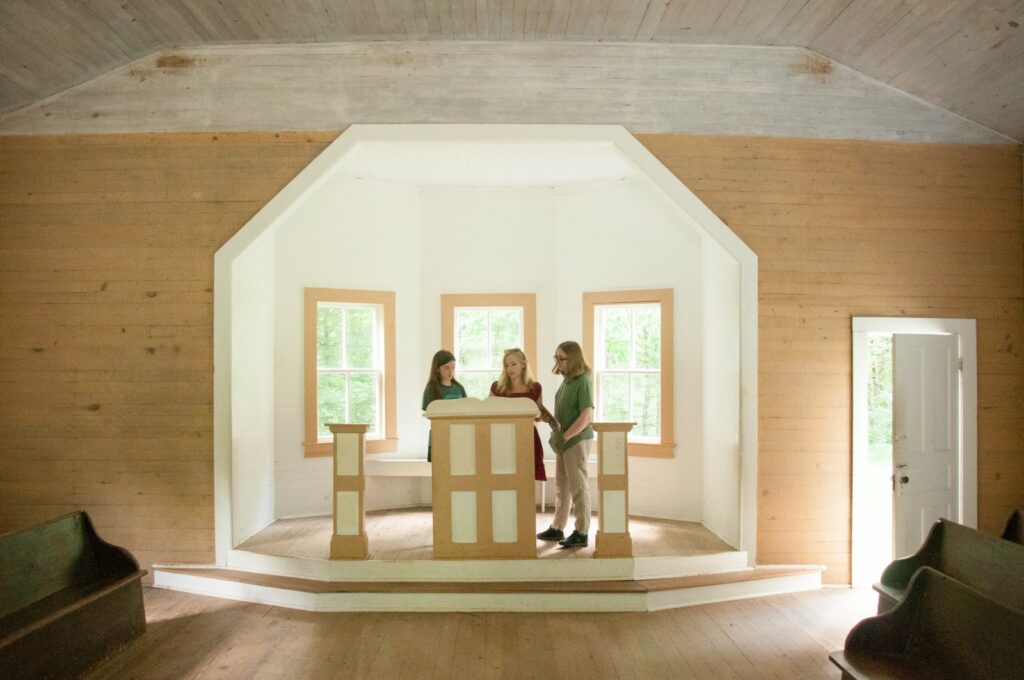Why We Need Forgotten Stories
 A solemn little one-room church in Tennessee’s Great Smoky Mountains has stood empty for nearly a hundred years. The doors hang in open, welcoming silence, the pews and pulpit still in place like they’re waiting for familiar voices to echo off the plank walls.
A solemn little one-room church in Tennessee’s Great Smoky Mountains has stood empty for nearly a hundred years. The doors hang in open, welcoming silence, the pews and pulpit still in place like they’re waiting for familiar voices to echo off the plank walls.
There have been stories in this place.
Generations of worship and weeping, baby laughter, passionate vows, and whispered gossip, all silent and forgotten. Even here, where thousands of tourists wander in and out every year, most of the stories will never be heard again.
That’s true for almost all words spoken since the beginning of time. Few stories make it past a generation or two. Most words are born and die in quiet corners without ever finding a stage.
Does that hiddenness make them less valuable?
As a writer, I’ve needed to wrestle with this question. Two years ago, I walked away from the possibility of a representation deal with a literary agent whose roster includes some of contemporary Christendom’s best-known authors. “Hiding a talent like yours in obscurity is a shame,” he coaxed when I told him I was unsure.
For a moment, I saw myself teaching on a stage beside the superstar authors he represents. And then I pictured my youngest daughter’s hazel eyes glowing warm at hushed words meant just for her. Giving my words to crowds would mean taking quiet moments away from my family. It was an easy no.
Over the next year, I poured renewed energy into writing articles and inspirational pieces that advanced the work of Bible translation, remaining in happy obscurity while my words made an impact on many. It was the best of both worlds.
Until it came to a sudden halt last summer.
In one dramatic week, my department at work began restructuring and my family entered an unrelated season of personal struggle. It was time for a change.
Before the summer ended, I had turned down another dream writing job and accepted a role alongside my husband in staff development so we could simplify our travel schedules and focus on our family. I didn’t regret it, but I felt completely disoriented.
My new rhythms absorbed every ounce of energy and creativity I had once poured into capturing life in meaningful words. I had certifications to attain, development strategies to devise, clients to coach, and a floundering family to keep afloat. Days rushed by, whisking a turbulent stream of significant conversations and experiences off into silence. No one would remember them, not even me.
But those forgotten words changed me. They changed my family. As powerful and formless as a flood, our untold stories have moved our foundations and carved the way for new growth.
Forgotten stories shape more hearts and destinies than the remembered ones. We need hidden words that tremble for a second in the air before they fall like raindrops, gathering into rivulets and streams and rivers that form the earth and bring life.
We need the forgotten stories — yours, mine, and the ones in that old Tennessee church. Families are still living out legacies set in motion by those generations of worship and weeping, the relationships made and broken there, the boys who came home from wars and the ones who didn’t, the doubt wrestled and the faith formed within those walls.
A few days ago, my healing little family stopped there for a few private minutes between other groups of tourists. We could almost smell the prayers of the saints soaked like incense into the hand hewn wood. As I stood behind the pulpit with my girls, the song “What a Friend We Have in Jesus” drifted into my mind almost as if I could hear its final fading notes. So I joined the song and my family joined me, our voices folding into the timeless echo of worship that has been and will be. Each note shimmered and fell and flowed away with the rivers of forgotten stories that shape the world.



Recent Comments